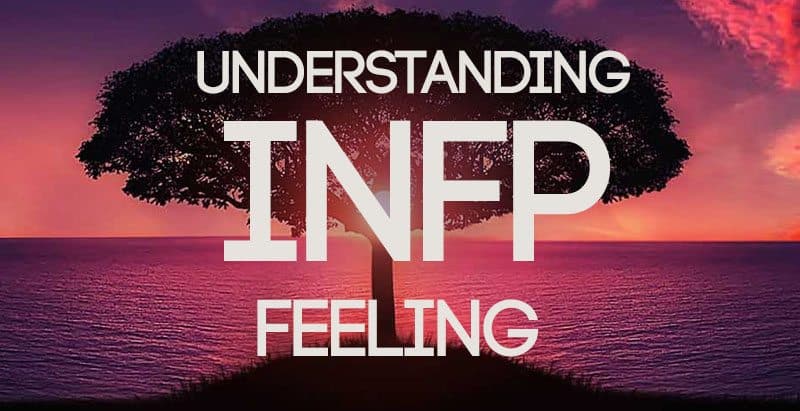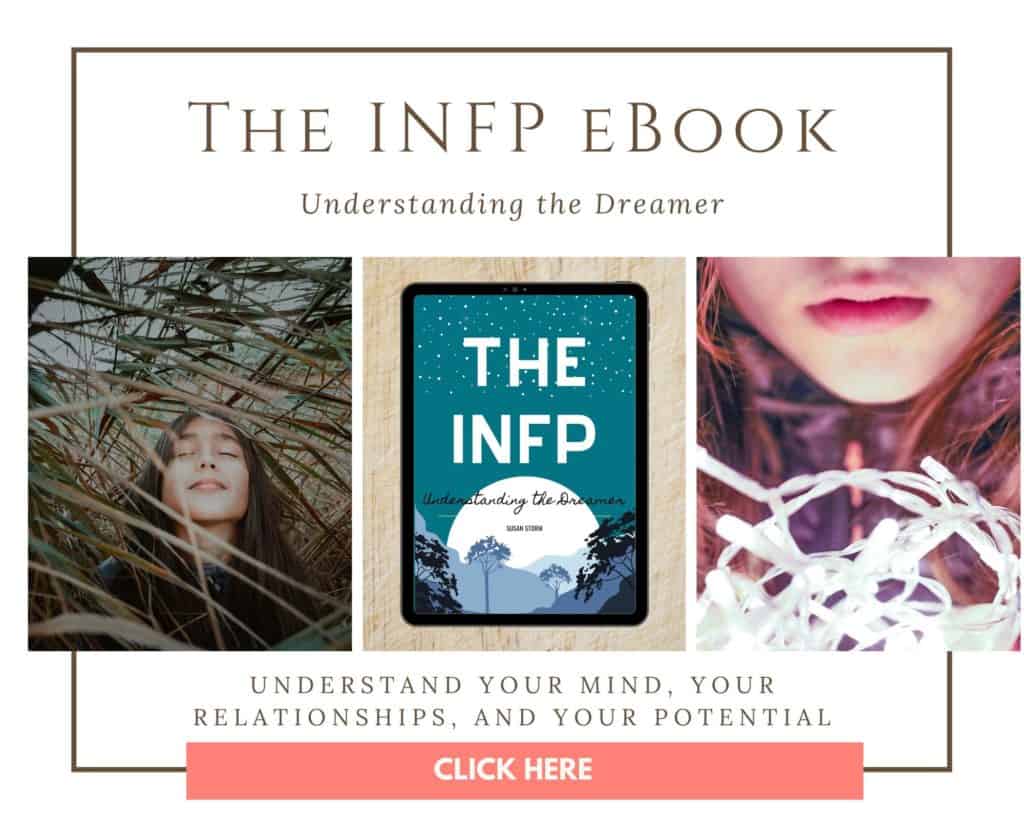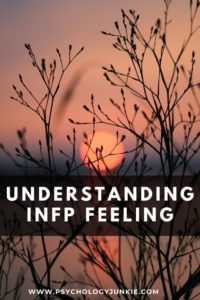Understanding INFP Feeling
“And now here is my secret, a very simple secret: it is only with the heart that one can see rightly, what is essential is invisible to the eye.”
– Antoine de Saint-Exupery, an INFP
INFPs are some of the most complex individuals you will ever meet. On the surface, they may seem quiet and unassuming, while inside they hold vast, imaginative worlds and intense emotions. They are highly individualistic in nature, holding firm to an independent set of values. They may seem sensitive, even shy, but they will stand up against any demon to hold to their cause. Joan of Arc, George Orwell, Vincent Van Gogh, and Franz Kafka were all INFPs. Their voice and their courage to express their beliefs and values make them a force to be reckoned with.

If you know an INFP, what you’ll see most readily is their auxiliary function, Extraverted Intuition (Ne). They will see possibilities and imaginative ideas everywhere and will want to find ways to inspire people with these ideas. Yet what really drives the INFP is their dominant function, Introverted Feeling (Fi). Fi gives the INFP an unwavering set of internal values (what’s right/important) that they seek to understand and mold in a deep, holistic way. On the outside, INFPs seem open-minded and thoughtful, but inside their values and beliefs are impenetrable. They may make modifications to their values as they understand themselves in a deeper way, but they will strive to be true to themselves no matter what peer pressure, orders, and demands are made for them to fit in or conform.
Not sure what your personality type is? Take our new personality questionnaire here. Or you can take the official MBTI® here.
This post contains affiliate links. I only recommend products I truly believe in.
Table of contents
Estimated reading time: 9 minutes
Understanding Introverted Feeling

Introverted Feeling (Fi) types have complex, intense, and personal beliefs about things. They live their life striving to understand themselves deeply, to express their beliefs, and above all, to remain authentic. Being honest and sticking to their personal code of ethics is their highest concern. Because Fi is introverted in nature, it is guarded against the outside world and INFPs will only show their feelings to those they feel they can trust implicitly. This is why when you get to know the INFP in a deeper, more intimate way, they may reveal a side of themselves you didn’t know existed. As they form deeper relationships they will reveal more of their introverted feeling side, and it often comes as a surprise. Suddenly, friends and family realize that underneath their open-minded demeanor the INFP has very strong judgments and morals that they will not compromise.
Introverted Feeling is often called “subjective feeling.” This is because Fi-users seek to live in accordance with their own personal values, beliefs, and ethics. They are very aware of their own emotions and strive to have internal harmony with them. A good way to understand Fi is to compare it to its opposite, Extraverted Feeling. Extraverted Feeling (Fe), or “objective” feeling, distributes its feeling across a wide breadth of people; looking for external harmony and often sharing its feelings more readily with others. Fe users are constantly swimming in the outer emotions expressed to them by others, while Fi-users instantly know how things impact themselves emotionally. Fe users may seem like social chameleons, modifying their countenance based on who they’re with, while Fi-users are intensely individualistic, and while private, will not change their feeling presence based on who they’re with.
Fi users funnel their empathy and passion into a select group of individuals. They are especially concerned with the underdogs of the world. This can mean children, the disabled, disadvantaged groups of people, or even animals. They will pour their energy into these groups of people, helping in any way they can. They will remain loyal to their cause or “their group” no matter what arguments or opposition they face.
This outpouring of energy into a select group of people is often why Fi is called “intensive” whereas Fe is called “extensive.”
Introverted Feeling inspires the INFP to seek out experiences that arouse their sympathy, passion, and inspiration. They often find this kind of inspiration in music, writing, travel, artwork, or charity work.
The Mysterious Feelers

Introverted Feeling is so private that on the outside INFPs may look somewhat unemotional. Because they don’t readily share their feelings, yet are deeply affected by them, they may appear calm on the surface while inside they are having an intense emotional response to what is happening.
When many people think of feeling types, they think of readily expressed external emotions. INFPs may seem like feelers in disguise. They may not exude emotion and enthusiasm all the time, but they care deeply and intensely. They may not open up to most people about how they feel, what they feel, or what impacts them, but they know and that’s what matters to them.
The intense emotions of the INFP become more apparent when they are emotionally affected or hurt. They often report that they cry easily, but hate it. They usually dislike showing their emotions because they are so private. They feel exposed and will often try to get away to a place where they can shed their tears without feeling the prying eyes of others upon them.
“If you looked down to the bottom of my soul, you would understand fully the source of my longing and pity me. Even the open, transparent lake has its unknown depths, which no divers know.”
– Hans Christian Andersen, an INFP
Characteristics of INFPs:
– They value internal harmony above all else.
– They are imaginative and creative.
– They have deeply held yet seldom expressed feelings and emotions.
– On the outside they seem reserved, yet inside they have very passionate and intense feelings and values.
– They are loyal and faithful to their beliefs and the objects of their passion.
– They are less concerned with what others think or impressing others.
– They are highly idealistic.
– They are usually very sensitive.
– They excel in fields that deal with possibilities for people; counseling, teaching, art, literature, science, and psychology.
– They usually have a gift for language and literacy.
The Neuroscience of Introverted Feeling

According to Dario Nardi, a UCLA professor and expert in the field of neuroscience, INFPs (and ISFPs) are the “consummate listeners”. Nardi explains in his book Neuroscience of Personality: Brain Savvy Insights for All Types of People, that INFPs “thoroughly engage all brain regions that process voice, words, and sounds; moreover, they may easily enter a unique and whole-brain state when listening to other people, whoever those people might be.”
Nardi goes on to say that INFPS are attentive to information withheld by other people. “They hear with precision and insight, and also carefully compose their own speech, attending to both content and delivery, for the desired impact.” He explains that this process helps them to weigh other people’s intents and motivations and also allows the INFP to speak with eloquence, grace, and carefully-selected words to understand others deeply and express themselves creatively.
Nardi found that INFPs are left-brained when they make decisions, and that while they come across as open-minded, they are actually “quite definitive about decisions.”
INFPs and Artistry

INFPs are driven to express their innermost values in a creative way. Indirectly expressing their emotional world through art, dance, music, or writing can help them to find meaning and profound truths within themselves. According to the MBTI® Manual, INFPs crave jobs that feature creativity and originality. They also show occupational trends in writing, counseling, and the arts.
Why Are INFPs Drawn to Artistry?
INFPs combine Fi and Ne to see ideas everywhere for self-expression. While Fi cultivates a unique inner value system and a passion for a select cause, Ne sees possibilities of expression in the external world that it hopes to see realized. Intuition and even the INFP’s inferior Extraverted Thinking (Te) are what bring those inner values to life. If you look at the works of many INFPs, you’ll see that their creations are filled with the passion of their cause. Albert Camus wrote in opposition to nihilism while delving deeply into individual freedoms. George Orwell spoke out against totalitarian and authoritarian social practices in Animal Farm and 1984. Vincent Van Gogh poured his emotion and imagination into his paintings, using the application of paint and symbolic colors to express his own subjective emotions.
If you look through history you will see how INFPs have drawn, written, painted, or expressed their true values and nature in their work. It is fascinating to see the passion and fervor of the INFP so eloquently and beautifully expressed.
Some Fun Facts About INFPs:
These facts are taken from the MBTI® Manual – Third Edition
– INFPs have a general advantage in foreign language learning.
– In a national sample that studied type and leisure activities, INFPs preferred writing, appreciating art, reading, and listening to music.
– Academically, INFPs prefer art, English, and music.
– When it comes to the work environment, INFPs prefer independence & achievement, a variety of tasks, and a clear structure. They also prefer a job that fosters their creativity and originality.
Any Questions?
Find out more about your personality type in our eBooks, Discovering You: Unlocking the Power of Personality Type, The INFJ – Understanding the Mystic, and The INFP – Understanding the Dreamer. You can also connect with me via Facebook, Instagram, or Twitter!

The INFP and Stress
Sources:
Want to know more about INFPs? Check out these amazing books!
Gifts Differing: Understanding Personality Type
MBTI Manual: A Guide to the Development and Use of the Myers-Briggs Type Indicator, 3rd Edition
Neuroscience of Personality: Brain Savvy Insights for All Types of People
Creative You: Using Your Personality Type to Thrive









The pieces fell into place with this analysis of INFP attributes. Routine is important to me though I want choices and to use my imagination for the possibilities. Here’s a small example: yesterday I was deciding whether to declutter my small utensils in the kitchen or going through my books. I wrote each one on pieces of paper and chose one; oh, small utensils, okay, I’ll go through my books. Having the choice of choosing takes away the idea I “should” be doing something. I am using this technique to get back into a writing routine.
Thank you, this was very informative. My partner is an INFP and I’m trying to understand them better. This helped.
I’m so glad!! Thanks for your feedback 🙂
A lot of this is very accurate for me especially the bit about stress, mostly I am considered quite calm but having too many options / or a big decision to make and also needless mundane tasks to do that don’t challenge me creatively – all these things make me quite stressed. And also the fun aspect of the INFP personality being mistaken for something superficial when in fact we are probably one of the deepest personalities who crave intellectual and stimulating conversations about life’s big questions. Oh yes and we prefer writing to phone conversations, we can think how to phrase things and bring them to a close.
I know that feeling and emotions not the same also that the fealing function, are so post to mean the same thing but they are connected. I recently realized that I am an INFP, but as a guy, I am so used to not fully embracing my emotional side rowing up , now that I can I don’t know how to really handle them. Yes I have gotten feelings lists and the categories they fit into and this has helped. I started to figure a little bit on what I stand for making little decisions based on them more but it still feels weird to me.
any suggestions? Heck, even just a little emotional support would do.
I am an INFP and this describes me perfectly! Impressive accuracy! Thank you
Hi there! It looks like the INFP and stress section is missing